This post may contain affiliate links. If you click through a link and make a purchase, I may receive a commission at no additional cost to you. As an Amazon Associate, I earn from qualifying purchases. Read the full disclosure here.
New year, new you, or so they say. Health and fitness goals are often at the top of everyone’s list.
You bought that gym membership or class package.
You laced up those new shoes, slapped on a fierce new outfit, nothing was going to stop you. For the boys reading, maybe you got some new headphones, or a new outfit too. Good for you.
But then a few weeks or months later, your fitness routine ended up on the back burner, again.
You know how this song goes.
Do you struggle to reach your fitness goals?
Many people fail at a consistent fitness program by choosing the wrong activities, setting unrealistic goals, and failing to understand how to move their bodies in the right way.
Everyone has their own set of unique challenges. But, there are some essential background questions you should be asking yourself before jumping into any exercise program.
Knowing the answers to these questions can save you time, money, disappointment, and maybe an injury down the road.
This post will take a comprehensive look at some of those questions. They are designed to make you think about background information that might help paint a better personal picture for success with fitness.
Many neglect to consider these questions, sabotaging their fitness goals from the start. Learn how to set realistic fitness goals by working through the questions everyone forgets to ask.
Grab the free workbook to follow along! And if you’re still stuck, discuss some of the sticking points with your healthcare providers or trusted fitness professionals.
Disclaimer: This content is for educational purposes and is not medical advice. Read the full disclaimer.
How to set realistic fitness goals
Here are the questions you should be asking.
What is my why?
Pardon the trendy question, but…
You’ve got to start here. Why do you want to add more fitness to your life?
What has changed that makes you want to prioritize your health?
Think deeper than because you should. For example, weight loss is a common goal, but “the why” is more profound than I want to lose 20 pounds and get summer-ready.
Your why is going to be specific to you. So what’s the real reason?
What are my health & fitness goals?
Goal setting is more important than it sounds. People lose interest quickly when they don’t have an achievable goal.
Make your fitness goals realistic, measurable, and specific to you.
Set goals in short term (1-3 months) and long-term (6-12+ months) formats to demonstrate progress to yourself.
Common goals are to lose weight, get stronger, exercise three times a week, start yoga, get more flexible, lead a healthy lifestyle, etc.
For short-term goals, focus on small attainable changes. Having both short and long-term fitness goals will help to show progress and keep you motivated.
Short-term goals should support your ultimate goal.
Smart fitness goals are useful benchmarks to help assess how your program is going. If you’re not meeting your goals in a timely manner, either something about the goal is not realistic, or something else needs to change.
You can also use the SMART acronym for making fitness goals. This stands for Specific, Measurable, Attainable, Relevant, and Time bound.
Examples of measurable health/fitness goals:
Of course, these will be made more specific and measurable by your individual goals, these are just ideas.
- A specific weight goal
- Improving blood pressure or blood sugar levels to reduce or eliminate disease risks
- Improve endurance to participate in activities at a certain level
- Run a 5K
- Lift heavier weights
- Exercise X sessions per week
What motivates me?
Goals and whys should be motivating, but sometimes we need more than that.
What else motivates you?
Are you the kind of person who needs someone to tell you what to do? Group fitness classes or personal training might be for you.
Do you get motivated by zoning out to a heart-pounding new playlist? Queue those tunes up!
Find things that will keep you moving, but try not to solely depend on external motivation.
How active am I looking to be?
Legitimate question.
Not everyone is looking to devote seven days a week to intense workouts or get shredded.
Some people are just looking to get healthier and move more. It’s all good.
Are you looking to go to a high-intensity cardio class, or do you just want to add brisk walks three days a week around your neighborhood? Maybe yoga and Pilates are more your speed? Or are you interested in weight lifting?
The point is, how active you’re looking to be can help you figure out which fitness programs will fit you. It’s also essential that the answer to this question aligns with your goals.
If you’re not a big fan of exercise, definitely read How To Be More Active When You Hate Exercise.

What are my current health issues/injuries?
Have you been cleared by your physician for physical activity?
Do you require any medical supervision?
Have you ever been told to avoid certain types of activities?
It’s important to understand your health so you can seek the appropriate guidance and avoid injuries.
Understand what parameters or exercise modifications you need to stay injury-free.
Not all fitness programs are safe for everyone. Be proactive and advocate for yourself.
What fitness activities do you enjoy and why?
You have to like what you do for fitness, or it won’t last very long.
What you enjoy can help guide you towards activities that fit your interests.
Equally as important is identifying what fitness activities you don’t like and why (other than it’s hard). There are so many different options than treadmills and ellipticals!
Related read: 18 Low Impact Workout Options To Keep You Moving
What have I struggled with in the past?
Consistency? Injuries? Let’s not just repeat history and hope for a different outcome.
What have you struggled with, and why?
Identify these challenges so you can develop ways to work around them. For example, if you frequently got injured, were you using proper form? Were you listening to your body? Were you taking appropriate modifications?
If consistency was an issue, how can you approach planning and time management differently this time?
What is my current fitness level?
This one’s a biggie.
I haven’t worked out for a year, but I’ll just jump right in at a super expert level. It will be fine. (Lands self in doctor’s office, unable to work out for weeks – falls off wagon.) — Don’t be that guy!
Overestimating your current fitness level can lead to injuries and be discouraging. Underestimating will not challenge you enough to reach your fitness goals.
It doesn’t matter where you used to be. Start at the right level and progress slowly. Going all-out doesn’t make up for lost time. Be smart.
Do I have a well balanced fitness program?
What does that even mean? I’m glad you asked!
The short answer is having components of cardio, strength training, flexibility, and balance sprinkled in throughout the week for overall health benefits.
Are you heavy on the cardio but no strength training? Or heavy on strength and no flexibility?
Haven’t read Secrets to a Well-Rounded Fitness Routine? Don’t miss out.
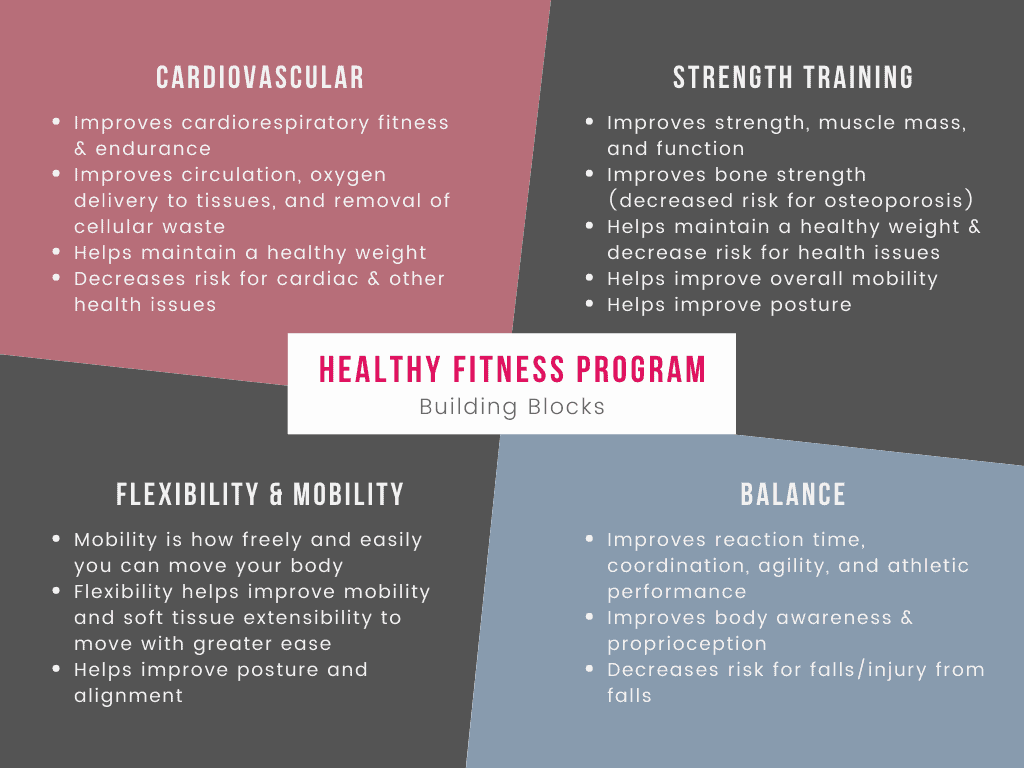
What is my ideal time of day to exercise?
When do you have the most energy? Morning, afternoon, evening?
Have you tried to push yourself through an exercise torture session that’s out of sync then when your body wants?
How’d that go?
The struggle is less real if you can match your exercise time to when you have more energy.
If your ideal time isn’t possible due to work or family obligations, try to carve out some fitness time consistently throughout the week. When you’re first starting out, it’s more important to stay consistent with short bursts of time than inconsistent with longer sessions.
What fitness opportunities are available?
Don’t think that plugging away on a treadmill is your only option.
Not everyone lives in an area saturated with gym and studio options. Even then, what is your price point?
Are you looking for home exercise equipment or subscription streaming workout services? Cheap and cheerful budget gym or a spa-like studio experience?
Take inventory of all fitness opportunities in your area that fit your budget and fitness goals to figure out what will work best for you.
Fitness apps are always a budget-friendly option to get a workout anywhere. Check out my full review of Aaptiv, and why I think it could serve a valuable place in your fitness journey.
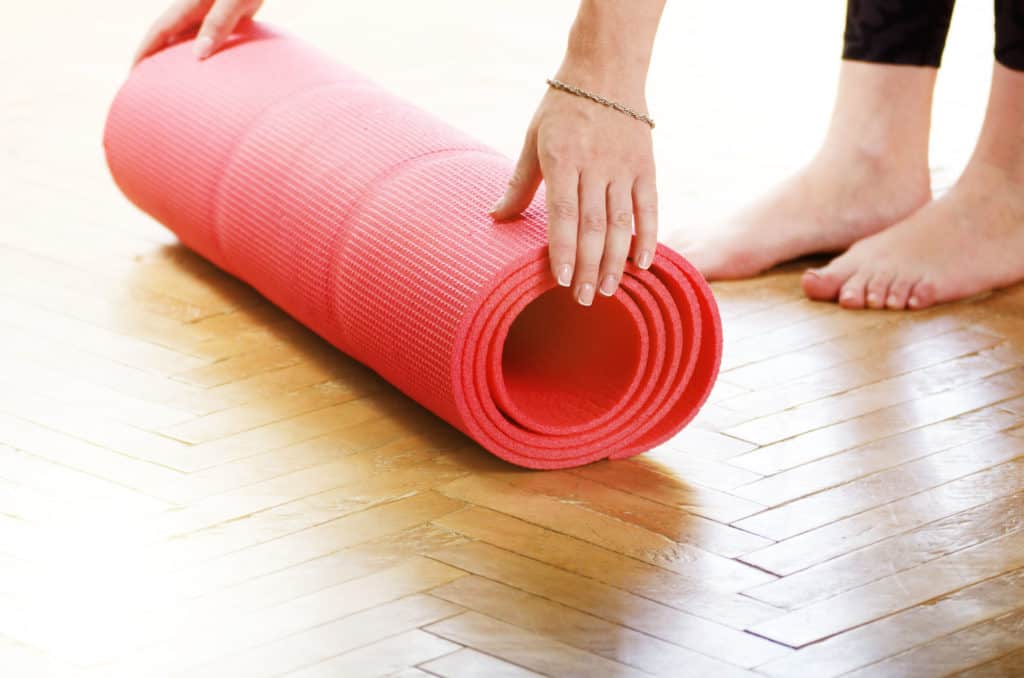
How can I modify exercises to my level?
Injuries are not the only reason to modify. (Say it with me!)
One of the great things about fitness is its ability to meet you where you’re at. Find ways to make workouts fit you, not the other way around.
Every person is different, has different anatomy, injuries, and fitness levels. Smart modifications can mean the difference between always being injured and a consistent healthy fitness program.
Make sure you check out this article all about modifications.
What else do I need to learn to reach my fitness goals?
We always need to learn more about something.
Do you need to learn how to use the equipment? Learn to improve your form to avoid injury? Improve knowledge of anatomy, and which exercises target each muscle? Improve body awareness?
Do you know where to go to get this information?
Don’t fall victim to sketchy sources. Make sure you check out this article on evaluating health and fitness information!
Seek out opportunities to learn instead of just going through the motions.
Where can I fit exercise into my busy schedule?
Get out your calendar.
Start looking at your schedule, write it down, and make it a priority for you. Plan your time for fitness before other stuff comes up.
Because other stuff always comes up.
Short but consistent sessions are better than longer inconsistent sessions. Wherever you’re at, aim to stay consistent.
Is my fitness plan realistic?
Time, convenience, cost, etc. Is this something you’ll be able to stick to that won’t put a strain on other areas of your life?
Is your gym close enough to home or work that it won’t cause needless time commuting? Is this something you can afford once that incredible discounted trial period is over?
What else do I need to make my fitness plan work?
Everyone is busy and fit people don’t magically have more time in their day. If you’re taking time for fitness, it might mean you’re taking away from something else. But your health should be a priority.
Need someone to flip the switch on that slow cooker while you get your fitness on? Or pre-plan quick weeknight meals so you can buy yourself an extra thirty minutes?
Are there areas where you need to ask for help to make your schedule work?
I’m sure you’re an amazing super-human, don’t be afraid to ask for help or schedule some time for you.
What are potential barriers to my fitness plan?
What else is going on at work or at home that might affect your ability to be consistent with a fitness program? Life happens. You already know what these barriers are, let’s address them right now and stop pretending.
Remember, we want to set ourselves up for success.
How can you work around those barriers?
Only you know what they are. Consider potential barriers during your planning phase.
What’s my back-up plan?
Something came up, and I didn’t get my workout. Instead of letting this derail the train, let’s have a backup plan.
If you still have time, you can do something at home. If you don’t have any more time in the day, let’s take a look at the schedule and see what can be shifted around. It can even be, tomorrow I’m getting back on track.
One bad day isn’t a free pass to fall off the wagon for a month.
It may be as simple as making smarter food choices that day.
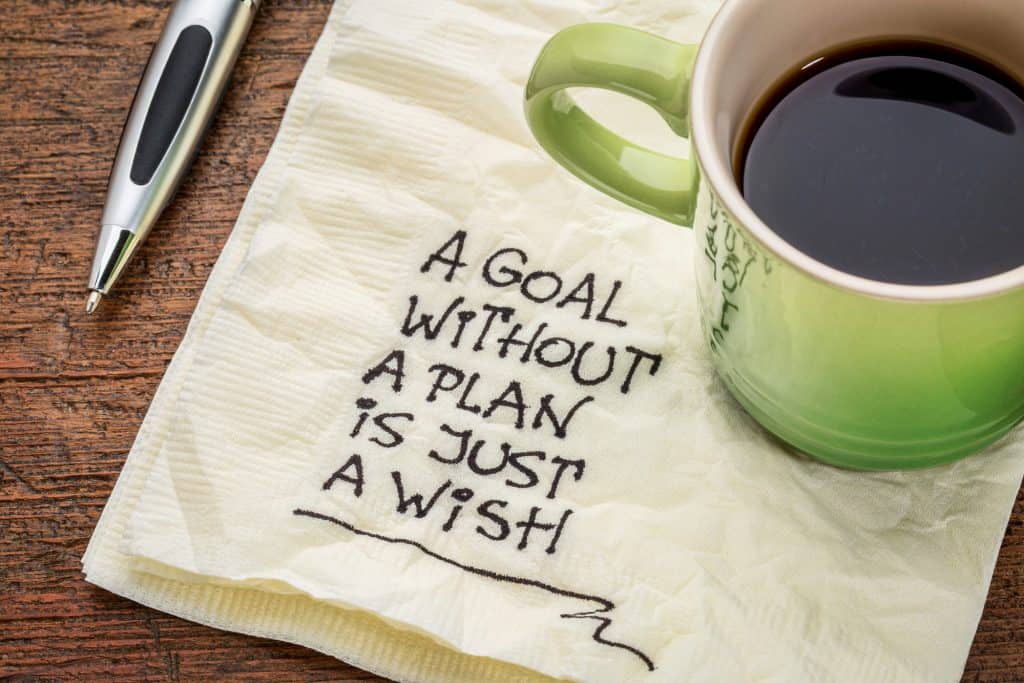
How will I plan?
How do you plan the rest of your life? Use that.
I’m a fan of Google calendar. Use whatever method you use to plan the rest of your life. If you’re not currently planning, then you need to start.
On Sunday, take a little time to plan out your week. Some studios require you to sign up online for classes, so this is an excellent way to plan and hold yourself accountable. Speaking of which…
How will I hold myself accountable?
Hopefully, you’re at a point where your why and goals are very important to you, and that should help with accountability.
Maybe a friend or family member can assist. Attending classes or becoming part of a group or community also helps improve accountability.
How can I monitor my progress?
The method you choose will be dependent upon what your goals are.
If it’s weight loss, you may choose a scale, take measurements, progress pictures, or go by how your clothes fit.
We all have those pants in the back of the closet that when they fit just right, everything is A-OK. Don’t pretend like you don’t.
Other options may be feeling stronger, more energized, or finished that 5K. Whatever your personal goals are will shape how you monitor your progress.
Nutrition & fitness goals
Have you ever heard the phrase “you can’t out-train a bad diet?”
If your goal is weight loss and you’re killing it in the gym, but your diet could use a little TLC, you’re not going to see the results you want.
Make sure you get the proper guidance to build a nutrition plan along with your fitness so you can start enjoying the results.
Enlist the services of a nutritionist or registered dietician if necessary. Fitness is more than what goes on in the gym.
How will I reward myself?
Yay, fun question.
It could just be the satisfaction of reaching your goals. Some people like to treat themselves. Just make sure it’s something that is not going to sabotage your efforts.
May I suggest some sweet new leggings or fitness watch?
How will I maintain once I reach my fitness goals?
Congratulations! You made it!
Now you have to keep it up.
A fitness program for health benefits is a lifetime commitment. The work is never really done.
Hopefully, you’re enjoying your fitness routine and look forward (most days) to going. It’s a lot easier to maintain than start from scratch every six months to a year.
Putting it all together
Now that you’ve thoughtfully answered these questions, you should have a deeper understanding of what you need.
You don’t need to wait until New Year’s, next month, or Monday to get started. We get a reset every day; we just don’t celebrate it with a party.
If you still don’t know where to go from here, take your thoughts over to your healthcare providers.
If you’re looking for more great fitness and injury prevention tips, head over to the start here page and take a tour!
You might also like:
- How To Be More Active When You Hate Exercise
- 7 Ways To Make Exercise A Habit
- Must-Have Fitness Essentials To Make Your Life Easier
- How To Exercise Safely with Low Back Pain
Featured image credit: Wavebreak Media Ltd. / bigstockphoto.com





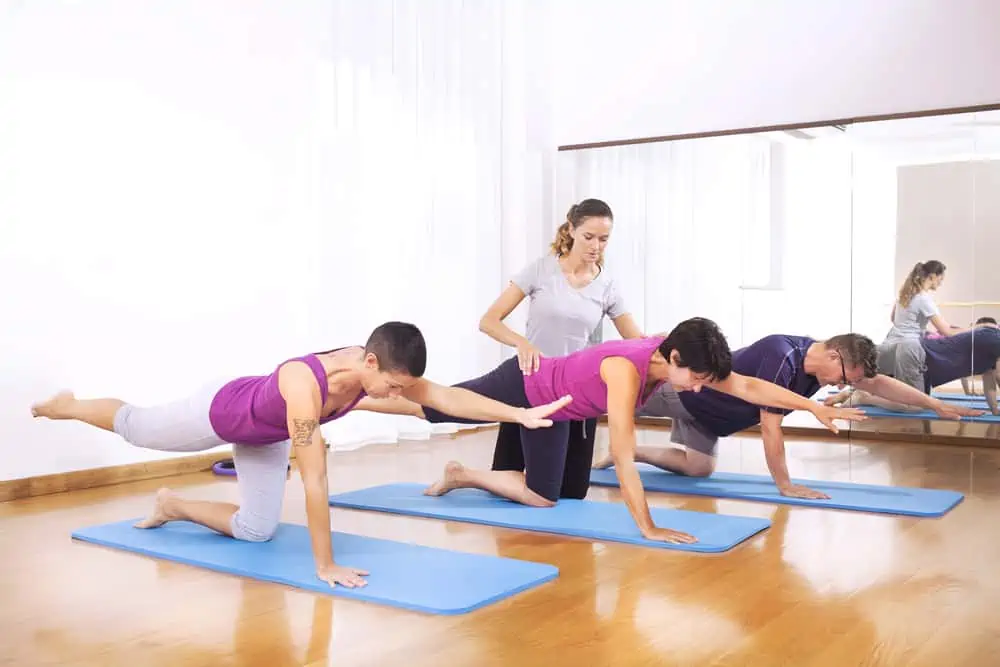
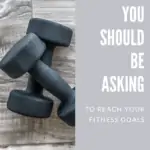

I had quit my gym a couple of months back which I had been going consistently for almost 2 years. It took me a couple of months of questioning if I should continue or not. Ultimately the main reasons was the cost and time. Now I need to figure out something else. This is super helpful. Thanks!
My passion is fitness and nutrition! I love the article! Such a good read. 🙂 Great pictures!
Thanks for reading!
I joined Planet Fitness a few months ago and need to be more intentional through the winter. The winter is the hardest time for me. I have done a little better this year but still have a ways to go!
Good solid tips. I think checking your current fitness level is particularly important because you can lose it pretty quickly when you’re older. Also warm-ups and stretching. I returned to tennis after a year out, still had the mindset of an 18-year-old and promptly ripped a calf muscle 🙂
Great Post and great questions! I work out 6 days a week but I’ve been thinking of taking it to the next level because I do the same exercises. I’m not challenging myself. This post has motivated me to get started!
Fitness is something that I have a hard time sticking with. These questions are really helpful to get some insight that will assist me in setting some good fitness goals. I would really like to get to the point where I’m exercising 3 times a week. I will be using these questions to come up with my goals and a plan to accomplish them. Thanks so much for sharing!
Thanks for reading, good luck with your fitness goals!
Sometimes it helps to find a fitness partner to work with and remembering your fitness goals daily to stop losing motivation
Why and accountability are HUGE for me in terms of fitness follow through. I’ll be looking at monitoring my progress better in 2020. Thanks so much for the insightful tips!
Thanks for reading!
Great info that really makes you think about fitness and your own personal motivations. All of that definitely helps you get into the right mindset, set your intention, and helps you to reach your goals. I’ll definitely be coming back to this when I re-evaluate my fitness routine and goals in a few months. Thanks!
Thank you, I’m glad you found it helpful.